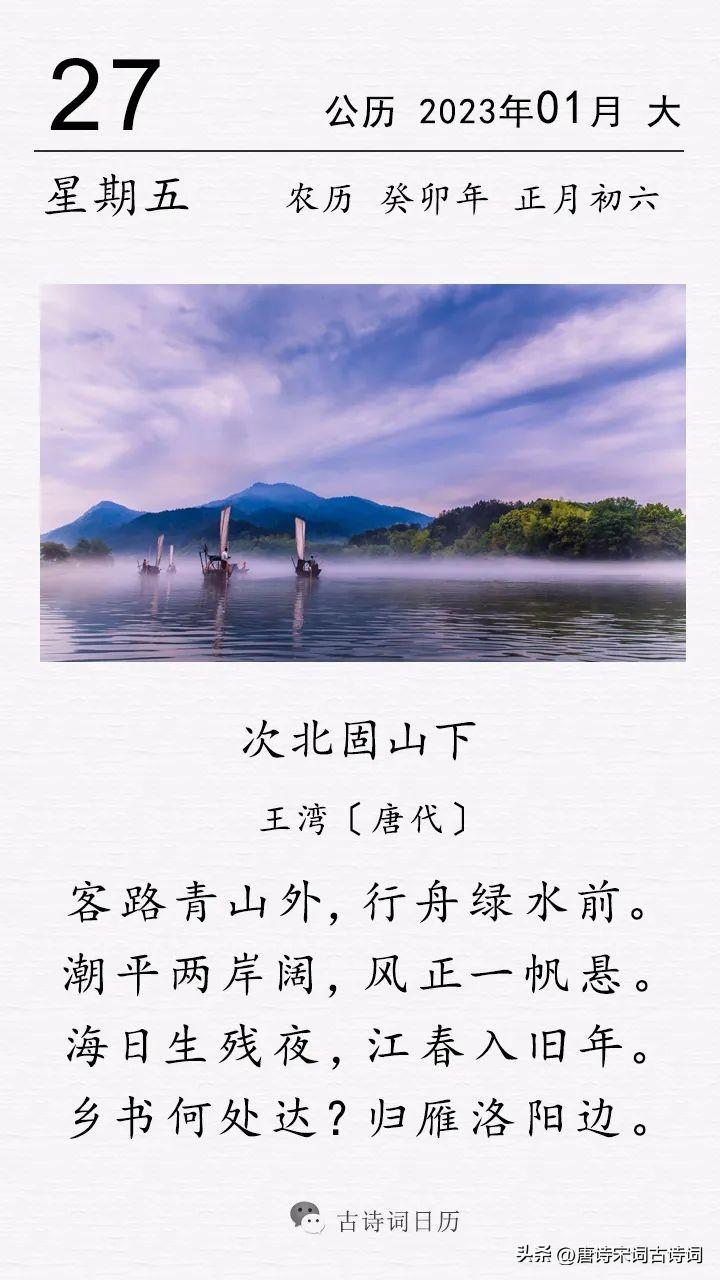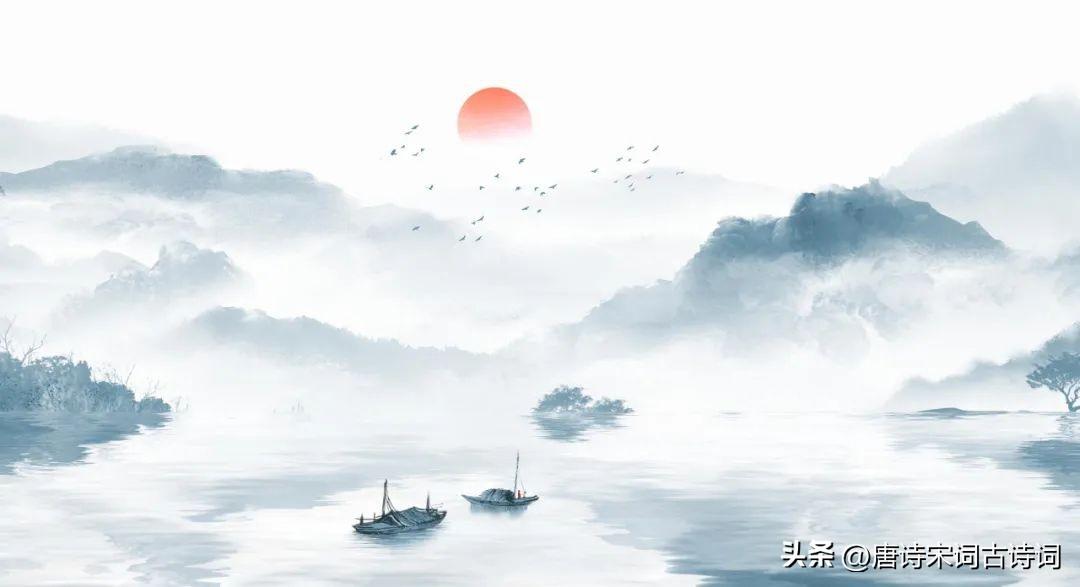
This is a famous landscape poem by Tang Dynasty poet Wang Wan.
The most wonderful thing about this poem is that it uses the scenery to express emotions, the scenery contains reason, the artistic conception is lofty, magnificent and sparse, and it expresses the prosperity of the Tang Dynasty The myriad weather and the vastness and vastness of the city make people yearn for it.
The time when the poet travels is between the end of winter and early spring, that is, around the New Year. Today is the sixth day of the first lunar month, it is very appropriate to interpret this magnificent New Year's work. "The tide is flat and the banks are wide, and the wind is rising and the sail is hanging." It is the best blessing that the poet gave us.
"Beyond the green hills, before sailing on the green water." The first couplet means that the traveler's road extends beyond the green hills ; The small boat on the river is driving between the green waters. This is to write "The Mood of Travel".
"Green Mountain" and "Green Water" are respectively embedded in two lines of poems, making people feel the beauty of Jiangnan and showing the The mood of the poet's journey is very pleasant. A closer look reveals that the first couplets are also neatly contrasted without revealing traces, especially the word "outside" and the word "front", which subtly express the beauty and dizziness of the scenery in the south of the Yangtze River. It is reminiscent of Wang Wei's "Hanjiang Linfan" good line, "The river flows beyond the sky and the earth, and the mountains are there or not."
"The tide is flat and the banks are wide, the wind is straight and the sails are hanging." , is very open; the river wind is blowing violently, and the sails are bulging and hanging upright. This is to write "the background color of life".

These two sentences are the best sentences of all ages. Like Wang Wei's "Lonely smoke in the desert, and the sun setting in the long river", they are both "horizontal" and "vertical" scenes, with lofty artistic conception and similar weather, but one is in the northern part of the country and the other is in the south of the Yangtze River.
The sentence "the tide is flat and the banks are wide" reminds people of Zhang Ruoxu's "the tide of the spring river is even with the sea level". In the heyday of the Tang Dynasty, Zhenjiang was where the Yangtze River and the sea meet. Wang Wei's poem, ""The sea tide sprays in the universe, and the river city enters the lake", is a wonderful description of the sea tide.
Because of the "tide", it feels "wide on both sides"; ". Because you have to travel far to see the beautiful scenery, because you have to start to reach your ideal. The poem completely describes the scenery, but it contains rich philosophy of life. At the time of saying goodbye to the old and ushering in the new, pioneering and enterprising, sailing far away, and bravely standing at the forefront are the attitude and background that life should have.
"Hai Risheng night, Jiang Chun into the old year." In the midst of it, slowly rising; still in the old year, the spring in the south of the Yangtze River has come, and the year is over again. This is to write "The Weather of the Tang Dynasty".
These two sentences are also eternal. On the surface, it seems to describe the alternation of day and night, the alternation of spring and winter, and the alternation of old and new, but it is actually about the change of life and the change of country.
The darkness of "Remnant Night" will eventually pass, and the light of "Sea Sun" will definitely come; The coldness of "Jiangchun" will definitely pass, and the warmth of "Jiangchun" will definitely come as promised. The new power will definitely replace the old power. Although the wheel of history will encounter some setbacks, it will always move forward forever.
There is a kind of positive interest in life in the poet's description of scenery. That is, dawn will replace darkness, spring will dispel severe cold, hope will replace despair, and all good things will surely come as promised!
It is said that the prime minister at the time, Zhang Shuo, read these two sentences with great admiration, wrote them himself, and hung them on the political affairs hall. Hu Yinglin, a poetry critic of the Ming Dynasty, spoke highly of it, and used these two sentences as a judgment mark to distinguish the early Tang, the prosperous Tang, and the middle Tang. He also said that the couplet "Hai Ri" "describes the scenery, which is wonderful through the ages".

Wang Fuzhi in the late Ming and early Qing dynasties commented that these two sentences are "transmitting the god of great scenery with a small scene" ("Jiang Zhai Poetry Talk" on volume)
"Where are the letters from home? Go back to Luoyang." The last couplet means, how can letters from home be delivered? Let Guiyan, who went north, take it back to his hometown in Luoyang! This is to write "Nostalgia in the Heart".
The end couplet, the poet is eager to write the scene in front of him into a letter and send it to his relatives in the north. It carried away the poet's deep nostalgia. "Luoyang Bian" echoes the opening "Green Water Front", one south and one north, opening and closing, making this poem a vast space, a broad artistic conception, and so beautiful!
It is worth mentioning that there is another version of this poem "Jiangnan Yi", which is included in "The Collection of Heyue Heroes" , "There are many new ideas in the southern country, and the eastward journey waits for the early sky. The tide is flat and the two sides are lost, and the wind is positive and the sails are hanging. Another footnote.
Looking at the whole poem, it blends emotions into the scenery, blends the scenes, and depicts the vitality of the New Year throughout the poem, but also implies nostalgia everywhere The love of family is an eternal masterpiece in Jilu's poems.
Articles are uploaded by users and are for non-commercial browsing only. Posted by: Lomu, please indicate the source: https://www.daogebangong.com/en/articles/detail/Wang%20Wans%20Under%20the%20Cibeigu%20Mountain%20Hai%20Risheng%20stays%20at%20night%20Jiang%20Chun%20enters%20the%20old%20year.html

 支付宝扫一扫
支付宝扫一扫 
评论列表(196条)
测试